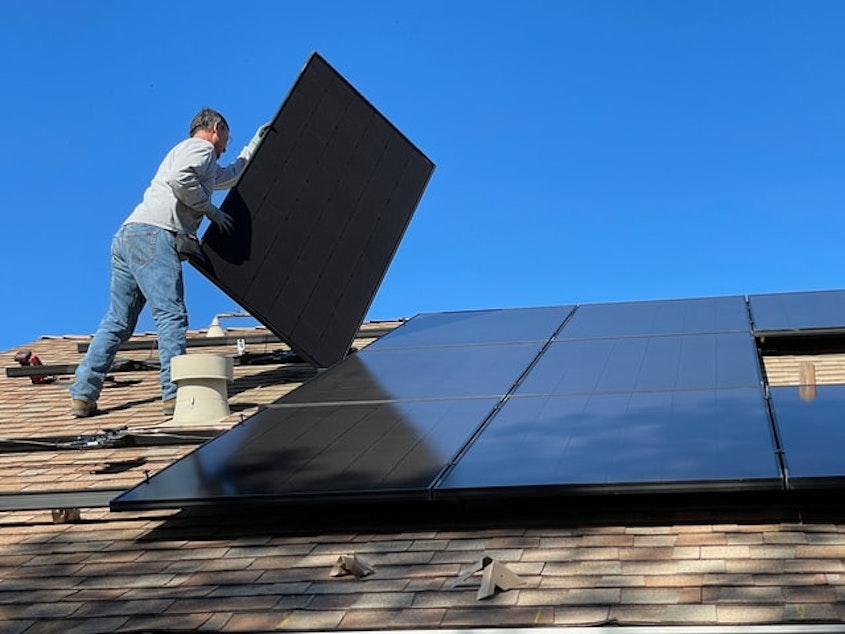What would you spend $38 million on? (It has to be ferries): Today So Far

- Washington State Ferries just got some fresh federal funding. Now it has to decide what to do with it.
- Washington has a shortage of 911 dispatchers.
- Flooding and outages and chilly air. Seattle's new youth jail doesn't work too well.
This post originally appeared in KUOW's Today So Far newsletter for August 11, 2022.
You have $38 million, and you have to spend it on Washington state's ferries. How do you spend it?
It could go toward delayed maintenance on a number of vessels. Then there's the staffing issues that Washington State Ferries has been suffering from over the past couple years. The state aims to upgrade boats to electric and hybrid systems. And, oh yeah, there's that ferry that just crashed into the Fauntleroy Dock and now needs millions in repairs.
Such options are all on the table for our state, which just got a $38 million bonus from an infrastructure bill passed in DC. On today's Seattle Now podcast, KUOW's Casey Martin dives into what WSF could be considering when it comes to this fresh funding. Though, if you ask riders ... they just want the ferries to run on time.
Whatever happens, it will be needed. The ferries are heavily relied upon, and not just for tourists. Don't tell the folks in Kitsap that I said this, but in many ways Kitsap is an extension of the Seattle side of the water — especially Bainbridge Island. I've often posed a question to people: If you had to choose between sitting in traffic for an hour (or more), or taking a scenic boat ride to work, which would you choose? A lot of folks in Kitsap have answered that question. The ferries carry crowds of commuters in and out of Seattle each day. They take their paychecks over the water to Bremerton, Silverdale, Poulsbo, and more. For them, any extra money to get the boats running smoothly is great news. Without those ferries, Seattle would lose a significant chunk of Kitsap workers (or just doctors and lawyers if we're talking about Bainbridge).
And side note: If you ever want some cheap, local entertainment — take the final ferries out of Seattle in the early a.m. hours and just people watch. I've seen a passed out Iron Man, and groups singing "their song" that they heard at a bar ... but they were singing two different songs at the same time.
Another sector of state services is also feeling some strain — 911 dispatchers.
As Northwest News Network's Austin Jenkins reports, the Washington State Patrol has a dispatcher vacancy rate of 40%. WSP communication offices in Bellevue, Yakima, and Marysville are less than 50% staffed. This is happening after WSP closed its Wenatchee office this year.
The centers are fielding emergency calls from landlines, cell phones, and text messages, and call volumes are up. Read the full story here.
And another arm of law enforcement in Seattle is dealing with its own unique set of challenges — floods, chilling air, and power outages ... all in one building.
There was a lot of controversy surrounding King County's youth detention center in Seattle (aka the Judge Patricia H. Clark Children and Family Justice Center). Now it's suffering from another controversy as the building doesn't seem to work. Workers noticed that parts of the building were freezing, so they plugged in portable heaters, which in turn tripped circuit breakers. Also, toilets didn't seem to flush. All that was annoying, but what really hit hard was the flooding.
Just one loose bolt on a water pipe led to flooding throughout hallways in the building. Drywall and ceiling tiles fell and floated alongside workers wading through the water. This has all led to contractors and subcontractors pointing fingers at each other, and lawsuits. KUOW's Anna Boiko-Weyrauch has the story here.
AS SEEN ON KUOW

Emerald City Comic Con has brought back its mask requirement for its event Aug. 18-21. The large pop culture convention usually draws tens of thousands of fans to the Seattle Convention Center. Face masks will be required in all areas of the convention. Unlike the last event, however, there will be no vaccine requirement. Seen here, cosplayer Pixie Bomber attends the 2021 ECCC. (Dyer Oxley / KUOW)
DID YOU KNOW?
It should be said that a lot of contributing factors came together, over time, to create the musical genre we now know as hip hop. But there is an argument that the original seed for hip hop was planted on this day, Aug. 11, in 1973 in the Bronx, New York.
It happened at a birthday party for the sister of Clive Campbell who was a teenager at the time. Campbell's father was in a band, and the teenager would play records between the band's sets to keep the vibe going. He noticed that the audience would be more into certain parts of songs. That's when they would dance and sing along. So he devised a way to connect two turntables. He would then play the same record on both, and switch between the two to keep the same part of a song going for longer, and longer. Campbell called this back and forth a "merry go round." Today, DJs call it the "break beat." You can see it anytime a DJ fades, switches, etc. between two different records. Dancers to this "break" became known as break dancers, break boys or break girls, aka b-boys.
Campbell had been practicing this move for a while before that birthday party in 1973. When he did perform, it was before a large crowd, enough to create a buzz. Campbell went on to become DJ Kool Herc, and by the end of the 1970s, "hip hop" would become a common term for an evolving musical genre.
ALSO ON OUR MINDS

3 ways the Inflation Reduction Act would pay you to help fight climate change
Money in the Inflation Reduction Act would make it cheaper for Americans to curb their own climate-warming emissions. While most of the bill's climate benefits would come from incentivizing major shifts, such as building more wind and solar power, individual choices can add up when undertaken on a large scale.

